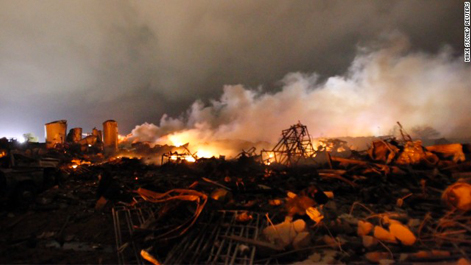© 2013 The Texas Lawbook.
By Natalie Posgate and Mark Curriden
The Texas Lawbook
(April 19) – The death and destruction caused by the Wednesday night explosion at the West Fertilizer Plant is likely to cost the owners of the plant, its insurance carriers and the makers and operators of the equipment storing the anhydrous ammonia hundreds of millions of dollars in legal compensatory damages, according to lawyers who are following the case closely.

If evidence shows that company officials acted in a willfully negligent or reckless manner, legal experts say the damages could soar to several billion dollars.
Within hours of the explosion, company officials and the insurance carriers hired a handful of law firms to prepare for a wave of litigation and governmental investigations that are already in the pipeline, according to a lawyer directly involved in the matter.
Legal experts said Friday that they expect the first lawsuits for personal injury and property damage caused by the fire and explosion to be filed as early as next week. The larger, more sophisticated legal complaints seeking wrongful death, product defects or environmental law violations likely will not be filed for several weeks or even months, until after the government investigations are complete and the evidence is clearer.
“The key question is, what was the triggering mechanism for the fire and explosion,” says prominent Dallas trial lawyer Frank Branson, who has previously represented victims in these kinds of industrial accidents.

Determining causation will be a major factor in deciding who should be held responsible, according to Branson and other lawyers.
“We’ll want to know whether West residents knew about the safety risks and whether local, state and federal regulators were told the truth about the dangerous chemicals this business was handling,” says Branson. “Why were nursing homes, an apartment building and school facilities placed so close to a facility that stored bomb-making components?”
Chuck Noteboom, a plaintiff’s lawyer based in Hurst, Texas, says the victims and lawyers are fortunate that government officials are treating the explosion site as a crime scene, because it means the evidence is more likely to be preserved.

“Almost everyone will have claims, maybe even West Fertilizer Co.,” Noteboom says. “While they are certainly seen as a potential defendant, many facts are still unknown. Did another company negligently design West’s storage facility? Did another company fail to do a proper inspection? Who started the initial fire?
‘The most common legal cause of action will be negligence, which just means you had a duty to do the right thing, you failed to do it, and that failure caused somebody to get hurt,” he says.
Michael Hurst, a partner at Gruber Hurst in Dallas, agrees that damages amounts will eventually reach nine or 10-digits, unless there is some mitigating factor that is unknown at this point.

“For example, did the adding of water to the fire by the firefighters ignite the explosion and significantly inflame the situation?” says Hurst. “The firefighters are protected from civil lawsuits by sovereign immunity and good Samaritan laws. That kind of factor could impact the cases.”
The legal cases will get significantly more complicated – and more costly for the company – if lawyers discover that company officials lied to or misled state or federal officials about safety issues.
“If corners were being cut at the fertilizer plant and if company officials knew corners were being cut, the damage amounts will go way up and company officials need to add a criminal defense lawyer to their legal team,” says Craig Pritzlaff, an environmental lawyer at Curran Tomko in Dallas.
Scott Deatherage, a partner at Gardere Wynne Sewell, says the state and federal government investigations could dictate the direction of the civil lawsuits, especially if the reports fault the company.
“Companies need to conduct their own internal investigations through their own counsel to try to ensure the reports and conclusions of the investigating agencies are factually accurate and respond appropriately to allegations regarding statutory or regulatory violations,” says Deatherage.
Other media outlets have reported that the Texas Commission of Environmental Quality cited the plant in 2006 for failing to obtain or qualify for a permit after receiving a complaint that June from a local resident of a strong ammonia smell.
The Dallas Morning News previously reported the fertilizer plant reported to TCEQ and local officials that it presented no risk of fire or explosion. Though the company reportedly had as much as 54,000 pounds of anhydrous ammonia on hand, the company said in a report the worst possible scenario would be a 10-minute release of ammonia gas that would kill or injure no one.
Within 24 hours of the explosion, more than a dozen Texas plaintiff’s law firms had reconfigured its website homepages to express sympathy to the victims of the explosion and to offer their expertise as lawyers in these kind of industrial accidents. On Google, six of the top 20 searches for “West Fertilizer explosion lawsuit” were links to one of those 12 law firms.
With so many willing firms out there, the State Bar of Texas advises victims to be cautious about who they choose as a legal advisor, which is why it established a disaster legal hotline this week. The hotline is designed to help those affected with a variety of services such as recovering lost documents, consumer protection issues, insurance questions and free limited, legal help from volunteer Texas lawyers.
“It’s really very important for people to be cautious and to check the background of any attorney they would consider hiring,” said Kim Davey, a spokesperson for the State Bar of Texas.
At least 12 people died, 60 others are reported missing and an estimated 200 people were injured by the fire and the blast.
Dallas-based Baron & Budd, a law firm that specializes in toxic torts, confirms that it already has been contacted by a handful of residents in West. The firm has a team already researching the environmental history and documentation of West Fertilizer Co.
“We don’t know if there’s any basis for a lawsuit yet, as we are being very cautious,” says John Langdoc, a partner at the firm. “All of our calls have been about protecting people’s potential claims and their rights.”
© 2013 The Texas Lawbook. Content of The Texas Lawbook is controlled and protected by specific licensing agreements with our subscribers and under federal copyright laws. Any distribution of this content without the consent of The Texas Lawbook is prohibited.
If you see any inaccuracy in any article in The Texas Lawbook, please contact us. Our goal is content that is 100% true and accurate. Thank you.
